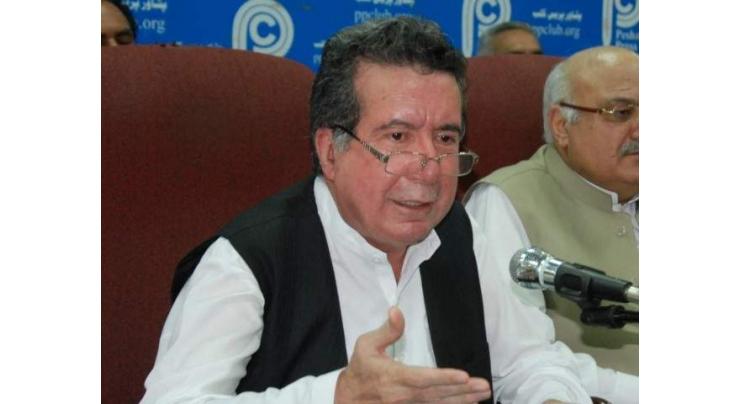
Need Stressed To Evolve Charter Of Economy
Muhammad Rameez Published December 07, 2017 | 05:55 PM

All the mainstream political parties agreed on Thursday to the proposal that a charter of economy should be decided and made it the part larger economic agenda for the welfare of people of Pakistan
ISLAMABAD, (UrduPoint / Pakistan Point News - 07th Dec, 2017 ) :All the mainstream political parties agreed on Thursday to the proposal that a charter of economy should be decided and made it the part larger economic agenda for the welfare of people of Pakistan.
The consensus was developed at a session on Charter of Economy: Moving towards a Consensus on Socio-economic Agenda on the concluding day 20th Sustainable Development Conference organized by Sustainable Development Policy Institute here.
ANP's Former Senator Afrasiab Khattak said that the poverty rate in FATA is 73 per cent so if charter of economy is initiated, equal focus can be given on all districts. PPP's Nafeesa Shah, MNA, said that the state of privatization in the charter of economy needs to be monitored and it should be checked if privatization is a success or not.
PPP's Syed Naveed Qamar, MNA, said that the current trade deficit is increasing and the Foreign Exchange Policy needs to be revised. Privatization is more a political than an economic decision so it is recommended that privatization should be done in the first year of elections, he said.
Haroon Sharif from the World Bank suggested to merge ministries and suggested as to how decisions should be made in a volatile country like Pakistan. PTI's Senator Shibli Faraz said that the privatization model needs to be revised.
Pakistan has only 5% of its trade with the region and more focus on flow of foreign exchange is imperative for the democratic government. Rana Afzal, MNA, said that Pakistan is providing cheapest petroleum in the region and two energy plants have been installed to improve the energy crisis.
Senator Noman Wazir said that state-owned enterprises can only work if there is zero political involvement at micro level. Advisor to PM on Finance Miftah Ismail said that the allegations against privatization are not fair as only 49% company ownership can be privatized.
Better Privatization models should be adopted so that more profits are generated, he added. Dr. Abid Q. Suleri, Executive Director SDPI, earlier said that this dialogue would be continued in future so that our political leadership may reach on consensus on other important aspects of our national economy as well.
Earlier speaking at a session on The Role of Social Protection in Eradicating Poverty: Policy and Practices, SDPI's Dr Shehryar Toru said people lack information about social protection programmes and out of 27 SPPs, two programmes, according to his study, are majorly known such as BISP (85%) and PMNHP (93%) in the Punjab and BISP (98%) and PMNHP (18%) in KP.
Saad Gillani from ILO conveyed the global consensus on the development of productive workforce without which economies cannot develop and grow. He suggested that access to social health protection and education improves productivity levels and has a positive impact on growth.
Zafar-ul-Hassan from Ministry of Planning, Development and Reforms said that National Social Protection Framework provides basic guidelines to implement SDGs. He said the Punjab is leading by having Social Protection Authority (SPA), KP is in process of establishing SPA, Sindh has yet to implement the policy, whereas Balochistan does not have any social protection policy.
To a question Sohail Chaudary from Punjab Social Protection Authority said that they have adopted a life cycle approach to social protection. A programme for disabled persons has already been started to support the lowest-income in the Punjab through a monthly cash assistance of Rs 1,200/- per month to be paid quarterly.
Related Topics
Recent Stories

Currency Rate In Pakistan - Dollar, Euro, Pound, Riyal Rates On 26 April 2024

Today Gold Rate in Pakistan 26 April 2024

ICC Womens T20 World Cup Qualifier, Match 2: Ireland Women open with Comfortable ..

Robinson, bowlers help New Zealand go 2-1 up against Pakistan

Shahzeb Chachar to hold khuli kachehri on April 26

Heatwave amid Israel's aggression in Gaza brings new misery, disease risk

Tourism must change, mayor says as Venice launches entry fee

Court adjourns Judicial Complex attack case till May 17

Nasreen Noori’s book ‘Popatan Jahra Khwab’ launched

Wafaqi Mohtasib inspection team visits Excise and taxation office

AJLAC announces 5th Conference titled ‘People’s Mandate: Safeguarding Civil ..

Pak-US officials engage to enhance trade, investment ties
More Stories From Pakistan
-
By-poll of Tehsil Council Chairmen KP on Sunday; 783772 to cast vote
19 minutes ago -
Naval Chief participates in 19th Western Pacific Naval Symposium in China
11 hours ago -
Int'l symposium addresses capacity building for safe, environmentally sound ship recycling in Pakist ..
11 hours ago -

Shahzeb Chachar to hold khuli kachehri on April 26
12 hours ago -

Court adjourns Judicial Complex attack case till May 17
12 hours ago -

Nasreen Noori’s book ‘Popatan Jahra Khwab’ launched
12 hours ago
-

Wafaqi Mohtasib inspection team visits Excise and taxation office
12 hours ago -

AJLAC announces 5th Conference titled ‘People’s Mandate: Safeguarding Civil Rights in South Asia ..
13 hours ago -

IBCC to promote educational excellence, expand regional presence
13 hours ago -

Pakistan embassy organizes scholarship award ceremony in Kathmandu
13 hours ago -

SC to hear case pertaining IHC judges' letter on April 30
13 hours ago -

SC orders removal of barriers outside buildings in Karachi
13 hours ago








